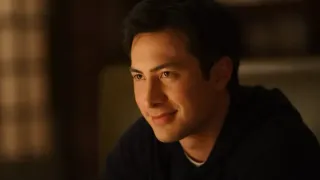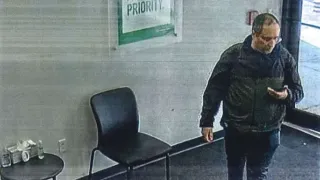November 7, 2023
NYTheater: Inside 'Merry Me' – A Very Merry Queer Cocktail
Frank J. Avella READ TIME: 15 MIN.
"We do not live in a world where people lose licenses for traumatizing a gay person's psyche..."
So, with great irony, says the oversexed, underorgasmed, Navy Lieutenant Shane Horne (Esco Jouléy) to her therapist and former/sometimes-still lover, Dr. Jess O'Nope (Marinda Anderson), in Hansol Jung's zany, subversive, farcical comedy "Merry Me," currently playing at New York Theatre Workshop.
Horne is trying to convince O'Nope to fib a bit and say she used gay conversion therapy on her so she will be seen as a cured heterosexual, saving her from General Memnon's (David Ryan Smith) wrath. (Aga, to you and me!)
The play is set on an island during a conflict that could be happening today or in ancient Greece, where a blackout has stymied the Navy, who want to fight. Anyone. Horne has utilized this time by bedding all of the ladies on base, including the General's wife (which is why the General is wrathful). Alas, Horne pleases everyone, but cannot seem to achieve her own "merries," as she calls it.
Meanwhile, a couple of newlyweds, Sapph (Nicole Villamil) and Private Willy Memnon (Ryan Spahn) – the latter the General's son – are having sexual issues of their own.
And our narrator turns out to be the Angel from Tony Kushner's "Angels in America" (with the blessing of Kushner), Shaunette Renée Wilson, who fabulously takes us through this wild and wacky Greek tragedy-meets-Restoration comedy that's billed as "an intoxicating queer cocktail!"
Directed with a skilled, but twisted (in the best way), eye by Leigh Silverman, "Merry Me" was written by Jung for Silverman, who requested a "lesbian sex comedy" after directing some of Jung's more serious work. The play was commissioned, written, and then halted by the pandemic. But post-lockdown, "Merry Me" was immediately slated to premiere at New York Theatre Workshop. Jung offers, "I've never had a play happen this fast... New York Theatre Workshop is so dreamy to work with as an artist."
The award-winning playwright, who hails from South Korea, collaborated with Silverman on a number of her plays including "Cardboard Piano" and "Wild Goose Dreams," the latter a very personal work about a North Korean defector that deals with loneliness and suicide.
Jung's other credits include "Wolf Play," "Among the Dead," and "More Sad Things." Her work has been developed at Royal Court, New York Theatre Workshop, Berkeley Repertory, Sundance Theatre Lab, and the Lark. She has written for the Apple+ series "Pachinko" and the Netflix reboot of "Tales of the City."
Leigh Silverman has directed over 60 plays and musicals both on and off-Broadway, including "Violet" starring Sutton Foster (2008 Tony and Drama Desk nominations), "Grand Horizons" at 2ST, "Well" at The Public, The Shed's "The Search for Signs of Intelligent Life in the Universe," "Sweet Charity" at The New Group, also with Sutton Foster, and the upcoming Broadway production of Shaina Taub's suffragist musical "Suffs," which is being co-produced by Hillary Clinton.
"Merry Me" is currently running at New York Theatre Workshop through November 19. For tickets and more info: https://www.nytw.org/show/merry-me/
EDGE had the pleasure of speaking with both Hansol and Leigh about the process of getting this clever, quirky queer concoction to the stage.
On the Genesis of 'Merry Me'
Leigh Silverman: The last plays that we worked on together, "Wild Goose Dreams," her other play, "Cardboard Piano," and I had done a number of readings and development workshops of her play "Wolf Play." All of those plays were incredibly sad, dealt with death and loss and grief in the most profound way. She's an astoundingly good writer, and I just was so excited about working together. And I said, "But the next time can we do something funny, something that makes coming to work every day, not feel like you're ripping your heart from your skeleton?"
Hansol Jung: We had been working on ("Wild Goose Dreams") for two years, through many development stages. And we were walking to Whole Foods on a break for, like, wellness shots, because we were both sick. And we were really sad that this was coming to an end... And I was like, "What should I write next so we can be in a room together?" She was, like, "Can we just do a comedy? Can it be a lesbian sex farce?" I was, like, "That's really not up my alley." She was, like, "Take a thing in public domain and adapt it." And I was, like, "That's a good idea, actually."
On Writing the Play
Hansol Jung: I looked at restoration comedy. I hated restoration comedy. I majored in English Lit in college, and that was the one period I was, like, "I don't get why this lasts. Why are we still reading this?" But for some reason, "Country Wife" stuck with me... there's this one scene in that play [where] I actually laughed... among literary circles, it's the famous China scene. That sparked the idea... Trying to adapt it was not as easy/ "Change the genitalia, maybe it'll work." It did not work, because female desire and male desire is so different, and desire is what propels plot structure. So, I ended up pulling from all these other plays from different eras of theater history. The engine of it is male desire. Like "Iphigenia in Aulis" by Euripides, "Angels in America" by Kushner.
Putting those ingredients together helped me articulate what I thought female desire – or the plot thereof – looks like.
Leigh Silverman: It was such a shock to me when she first wrote it. I have many relationships with different playwrights, but no one has ever listened to my request for what kind of play to write... She really understood on whose shoulders she was standing on as she took on writing this play. And then in her own brilliant way, was able to spin this incredibly amazing, strange, gay mash-up of all these different kinds of plays... it is so funny, but it is also incredibly heady. The references range from the Greeks to Thornton Wilder to Brandi Carlisle, to Joni Mitchell to "Angels in America."
On Putting It Together
Leigh Silverman: It was originally commissioned by the Public Theater... then we did a reading at New York Theatre Workshop in April. And the first-ever time in my career experience, the artistic director committed to it in the room at that time, and was, like, "I want it to open my season," which was in three months... I really give a lot of credit to Patricia [McGregor], who's the new artistic director of New York Theatre Workshop, both for her leadership, for knowing what she likes, for her ability to just commit and then support the work that has to get done... it's been a very fast and furious process, and certainly couldn't have happened if Hansol and I didn't have a multi-year, multi-play relationship before now.
Hansol Jung: The cast came together fairly quickly, because we just loved the people who did the Public workshop. And then it was this weird thing of, "I don't know my play at all. It's draft two, I don't have a personal relationship with this play, and I'm developing it while these other people are also developing their personal relationships with my play that I haven't quite figured out yet." And in normal circumstances, that sounds like a playwright's nightmare. However, it was such a generous room, the way Leigh ran it, and the way people were able to give offers on what stayed and what didn't. All that felt so safe and exciting.
Leigh Silverman: Hansol is a very active listener during rehearsals, she's very concentrated. She's very sure about how many times she needs to hear something before she's willing to change it. She's a very thoughtful writer... So, I'm constantly just trying to give her what she needs, both in the rehearsal and in the previews, to be able to set her up for continued rewrites, new thoughts. And we'll just keep working on it until they throw us out.
It felt like a very flexible and easy, elastic collaboration where we were working, not by talking about how to work, but just doing the work. And then I would respond with writing, and then she would respond with how to stage it. And I would respond with more writing... that was just so delightful.
On Queerness and the Queerness of the Play
Hansol Jung: I came to my queerness quite late in life. And, also, American queer is a very specific culture [different from] Korean queer – it's mostly closeted there, at least when I was there... When Leigh and I started collaborating on "Cardboard Piano" – she has, sort of, been my owl, the older, wiser lesbian, that guided me.
I wasn't trying to make it queer or make it diversely queer. The intention was always to hold as many people as possible, but also make it as funny as possible. And make the jokes not just for one culture, not just for lesbians, but for straight people, for asexual people, because in my mind sex, queerness, desire are very closely related to hope, imagination, and those are the things that we live for... I wanted a very Hansol and Leigh version of "This is why we live." ...It has to be queer, because it's from a female lens and thus I queered it up, unintentionally.
Leigh Silverman: In the desire to work and to be a freelance director who can live in New York and do this as my full time job, I'm incredibly lucky to have found playwrights who are writing ways that intersect with my lived experience, intersect with what I'm interested in putting on stage, and, whether it's queer or not, my main focus in my work has always been to put underrepresented stories on stage and to work with people who may not be in our mainstream and who are working on shows that are really form-bending. That's really my genre. I've done like, sixty-something plays, and three of them had a couch! [Laughs] If this is really weird and hard to understand on the page, sign me up.
On Why There are More Plays about Queer Men than about Queer Women
Leigh Silverman: I think it's there just more plays about men in general, there are more plays written by men, directed by men. We live inside the patriarchy, so, lucky us. There's a real lack of support. Of course, it's changing, but historically plays written by women, about women, with female protagonists – certainly about women dealing with their sexuality, no matter what it is, or where it falls on the spectrum – these are just not plays that have been celebrated or remembered. Historically, if you have to go to "The Children's Hour" – and I love "The Children's Hour" and I love Lillian Hellman – but when you think about plays like that, and you talk about [the theater company] The Five Lesbian Brothers, it remains a very niche audience. And I think there hasn't been the celebration of certainly women in general, but specifically queer women, their writing, their culture.
I feel like all of the plays I've done at New York Theatre Workshop have all been about this very topic. They've all been comedies and, in some ways, they're all adaptations of classic plays, too, which has been really interesting. And I think that that's what we as queer women do, is we take what is in the culture and subvert it and offer it back, potentially, in a new, different form than what people were expecting.
Hansol Jung: Both David [Ryan Smith] and Ryan [Spahn] are gay men, and I'm sure they've offered a lot that brings all of that into the play as well, that I've probably responded to and wrote around, so I'm very indebted to everybody.
On Audience Reaction
Hansol Jung: It's been all over the board, it's been consistently very responsive, which is very rewarding... But it's funny, I can tell, like, if the majority of the audience is more straight or more queer, more lesbian and less lesbian, because there are specific lesbian jokes in there... And age: I can tell where the older people are sitting, versus where the younger people are sitting, based on where the laughs are coming from... I learned I can't control any of it. Comedy is about culture... everyone has a different button. And it's just been gratifying to know that you can make a whole piece that feels unified to me, that can hit different people's different buttons.
Leigh Silverman: Particularly, in this moment, to be able to laugh with a group of people... it is, in a way, exactly what theatre is meant to do, which is to bring us together and offer this catharsis. There is nothing more soothing in this moment than to be in a room full of people laughing.
On Leigh's Being Broadway Bound
Leigh Silverman: We've been working really hard since the Public. The run at the public was very hard... we never had an opening week, we were shut down from COVID in the initial run for 12 days, and then we lost 27 performances at the end of the run in the third extension... I have a brand-new creative team. I have a new choreographer, and we're going to the very beautiful Music Box Theater... And it's been really exciting to welcome two new co-producers, Hillary Clinton and Malala (Yousafzai), and at this moment to have those two formidable women making their Broadway debuts, as well as a number of Broadway debuts in our company – Shaina (Taub) most of all, debuting as the writer, composer, and the star of the show feels really significant. We go into rehearsal in early February, and it just feels like a really exciting moment to bring the show back and to bring it back in its new form.
On Hansol's Next Project
Hansol Jung: I'm working on a new play called "The Almonds." It's a comedy about despair, yet again.






